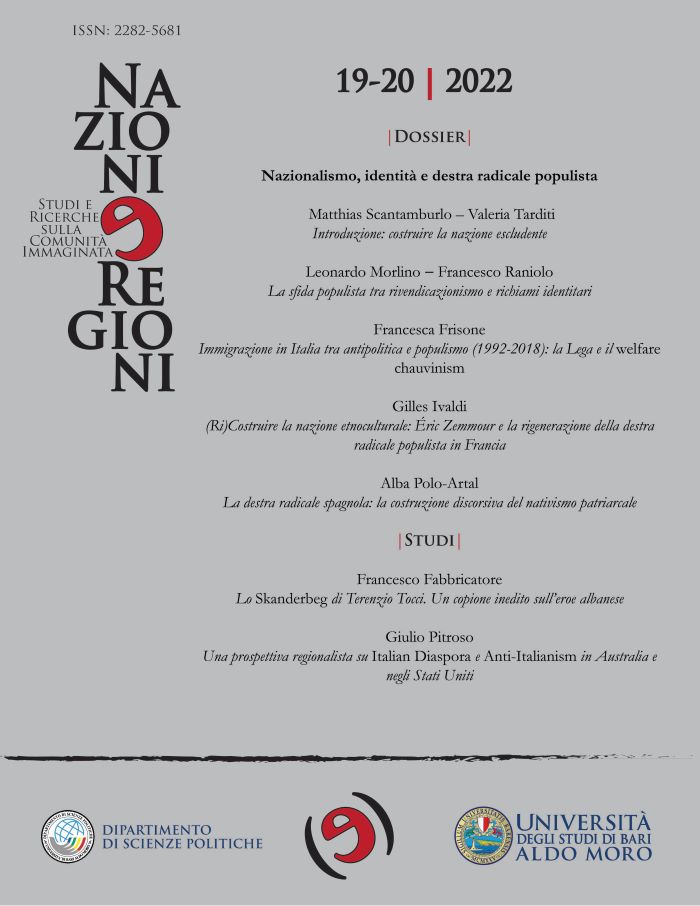(Ri)Costruire la nazione etnoculturale: Éric Zemmour e la rigenerazione della destra radicale populista in Francia<br><br>(Re)Constructing the ethno-cultural nation: Éric Zemmour and the rejuvenation of populist radical right politics in France
DOI:
https://doi.org/10.15162/2282-5681/1680Parole chiave:
Zemmour, ultradestra, populismo, nazionalismo francese, nativismo, autoritarismo, far right, populism, French nationalism, nativism, authoritarianismAbstract
Questo articolo riflette sulla morfologia dell’ideologia di Éric Zemmour e sul suo rapporto con il più vasto fenomeno della destra radicale populista. Basandosi su un’analisi qualitativa della campagna di Zemmour per le elezioni presidenziali del 2022, il testo mostra come la sua ideologia condivida i tipici tratti nativisti, autoritari e populisti della destra radicale populista. Il suo nativismo è fondamentalmente di orientamento etnoculturale, in quanto abbraccia l’idea difensiva ed escludente di una nazione ‘eterna’ elaborata dagli autori nazionalisti francesi all’inizio del Novecento. La sovranità nazionale va riconquistata al fine di proteggere la comunità del popolo dalle minacce culturali ed economiche esterne e di liberare la Francia dal giogo dei meccanismi e delle istituzioni internazionali. Infine, l’analisi mette in evidenza il populismo e le idee autoritarie della società di Zemmour, che ne informano le posizioni da destra reazionaria, antifemministe e sessiste, e la sua critica delle élite ‘progressiste’ e della cosiddetta ‘tirannia delle minoranze’. In generale, l’analisi conclude che le evidenti tendenze illiberali di Zemmour rappresentano una sfida importante per i valori e i principi fondamentali della democrazia liberale in Francia.
This paper reflects on the morphology of Éric Zemmour’s ideology and its relation to the broader populist radical right phenomenon. Drawing from a qualitative analysis of Zemmour’s campaign in the 2022 French presidential election, the paper shows that his ideology shares the typical nativist, authoritarian and populist features of the populist radical right. His nativism is primarily ethno-cultural in orientation, embracing the defensive and exclusionary vision of an ‘eternal’ nation developed by French nationalist writers in the early 20th century. National sovereignty must be regained in order to protect the community of the people from external cultural and economic threats, and liberate France from the yoke of international mechanisms and institutions. Finally, the analysis points to Zemmour’s populism and authoritarian views of society, which inform his reactionary right-wing anti-feminist and sexist positions, and his criticism of ‘progressive’ elites and the so-called ‘tyranny of minorities’. Overall, the analysis concludes that Zemmour’s clear illiberal leaning represents a significant challenge to the fundamental values and principles of liberal democracy in France.
Riferimenti bibliografici
Adamidis V. (2021), «Democracy, Populism, and the Rule of Law: A Reconsideration of Their Interconnectedness», Politics, https://doi.org/10.1177/02633957211041444.
Benveniste A. – Pingaud E. (2016), «Far-Right Movements in France: The Principal Role of Front National and the Rise of Islamophobia», in Lazaridis G. – Campani G. – Benveniste A. (eds.), The Rise of the Far Right in Europe, Palgrave Macmillan, London, pp. 55-79.
Basile L. – Mazzoleni O. (2020), «Sovereignist Wine in Populist Bottles: An Introduction», European Politics and Society, 21/2, pp. 151-162.
Bertossi C. – Duyvendak J. W. – Foner N. (2020), «Past in the Present: Migration and the Uses of History in the Contemporary Era», Journal of Ethnic and Migration Studies, 47/18, pp. 4155-4171.
Betz H.-G. (2017), «Nativism Across Time and Space», Swiss Political Science Review, n. 23, pp. 335-353.
Betz H.-G. (2019), «Facets of Nativism: a Heuristic Exploration», Patterns of Prejudice, 53/2, pp. 111-135.
Blanc W. (2017), «Spectres de Charles Maurras: Comment le néomaurrassisme fabrique le “roman national” contemporain», Revue du Crieur, n. 6, pp. 144-159.
Bonikowski B. – Halikiopoulou D. – Kaufmann E. et alii (2019), «Populism and Nationalism in a Comparative Perspective: A Scholarly Exchange», Nations and Nationalism, 25/1, pp. 58-81.
Brubaker R. (2017), «Between Nationalism and Civilizationism: The European Populist Moment in Comparative Perspective», Ethnic and Racial Studies, 40/8, pp. 1191-1226.
Carroll D. (1994), «The Use and Abuse of Culture: Maurice Barrès and the Ideology of the Collective Subject», Paragraph, 17/2, pp. 153-173.
Carter E. (2018), «Right-wing Extremism/Radicalism: Reconstructing the Concept», Journal of Political Ideologies, 23/2, pp. 157-182.
Costello T. H. – Bowes S. M. – Stevens S. T. – Waldman I. D. – Lilienfeld S. O. (2020), «Clarifying the Structure and Nature of Left-Wing Authoritarianism», Psyarxiv, https://psyarxiv.com/3nprq/.
Crépon S. – Dézé A. – Mayer N. (eds.) (2015), Les faux-semblants du Front national, Presses de Sciences-Po, Paris.
Crewe I. – Sanders D. (eds.) (2020), Authoritarian Populism and Liberal Democracy, Palgrave Macmillan, Cham.
De Orellana P. – Michelsen N. (2019), «Reactionary Internationalism: The Philosophy of the New Right», Review of International Studies, 45/5, pp. 748-767.
De Spiegeleire S. – Skinner C. – Sweijs T. (2017), The Rise of Populist Sovereignism: What It Is, Where It Comes from, and What It Means for International Security and Defense, Centre for Strategic Studies, The Hague.
Duyvendak J. W. (2021), «Nativist Understandings. The Presence of the Past in Contemporary Dutch Debates on National Identity», Journal of Ethnic and Migration Studies, 47/18, pp. 4209-4220.
Fishbane J. (1985), «From Decadence to Nationalism in the Early Writings of Maurice Barrès», Nineteenth-Century French Studies, 1/4, pp. 266-278.
Hafez Farid (2014), «Shifting borders: Islamophobia as Common Ground for Building Pan-European Right-wing Unity», Patterns of Prejudice, 48/5, pp. 479-499.
Heinisch R. – Werner A. – Habersack K. (2020), «Reclaiming National Sovereignty: The Case of the Conservatives and the Far Right in Austria», European Politics and Society, n. 21, pp. 163-181.
Higham J. (1974) Strangers in the Land: Patterns of American Nativism, 1860-1925, Antheneum, New York [1st ed. 1955].
IPSOS (2022) Présidentielle 2022 | Le pouvoir d’achat, enjeu majeur de l’élection, 31-III, www.ipsos.com/fr-fr/presidentielle-2022/presidentielle-2022-enquete-thematique-pouvoir-achat (ultimo accesso 19-XI-2022).
Ivaldi G. – Gombin J. (2015), «The Front National and the New Politics of the Rural in France», in Strijker D. – Voerman G. – Terluin I. J. (eds.), Rural Protest Groups and Populist Political Parties, Wageningen Academic Publishers, Wageningen, pp. 243-264.
Ivaldi G. (2021), Éric Zemmour ou le nouvel avatar de la droite radicale populiste pan-européenne, Note Le Baromètre de la confiance politique, vague 13, décembre, Sciences Po CEVIPOF, Paris.
Ivaldi G. (2022), Éric Zemmour : un ‘backlash culturel’ à la française ?, Note Le Baromètre de la confiance politique, vague 13, février, Sciences Po CEVIPOF, Paris.
Kešić J. – Duyvendak J. W. (2019), «The Nation under Threat: Secularist, Racial and Populist Nativism in the Netherlands», Patterns of Prejudice, 53/5, pp. 441-463.
Mazzoleni O. – Ivaldi G. (2022), «Economic Populist Sovereignism and Electoral Support for Radical Right-Wing Populism», Political Studies, 70/2, pp. 304-326.
Mudde C. (2004), «The Populist Zeitgeist», Government and Opposition, 39/4, pp. 541-563.
Mudde C. (2007), Populist Radical Right Parties in Europe, Cambridge University Press, Cambridge.
Mudde C. (2020), Ultradestra: radicali ed estremisti dall’antagonismo al potere, trad. it. di A. D. Signorelli, Luiss University Press, Roma [2019].
Mudde C. (2022), «The Far-Right Threat in the United States: A European Perspective», The ANNALS of the American Academy of Political and Social Science, 699/1, pp. 101-115.
Müller J.-W. (2016), What is Populism?, University of Pennsylvania Press, Philadelphia PA.
Newth G. (2021), «Rethinking ‘Nativism’: Beyond the Ideational Approach», Identities, https://doi.org/10.1080/1070289X.2021.1969161.
Padis M.-O. (2022), «Le “Frexit” caché de Marine Le Pen», Terra Nova, 1-IV, https://tnova.fr/democratie/politique-institutions/le-frexit-cache-de-marine-le-pen/, (ultimo accesso 19-XI-2022).
Perrineau P. (2022), Le Vote clivé. Les élections présidentielle et législatives d’avril et mai 2022, Presses Universitaires de Grenoble/UGA éditions, Grenoble.
Pirro A. L. P. (2022), «Far Right: The Significance of an Umbrella Concept», Nations and Nationalism, https://doi.org/10.1111/nana.12860.
Prins B. (2002), «The Nerve to Break Taboos: New Realism in the Dutch Discourse on Multiculturalism», International Migration & Integration, n. 3, pp. 363-379.
Rahat G. (2022), «Party Types in the Age of Personalized Politics», Perspectives on Politics, pp. 1-16. https://doi.org/10.1017/S1537592722000366.
Rosenberg E. (2022), «Barbarians at the Gate: Nativist Religious Rhetoric and Defining the “People” by Who They Are Not», Party Politics, https://doi.org/10.1177/13540688221130491
Roussel E. (2022), «De Maurras à Poujade : les messages subliminaux d’Éric Zemmour», Revue des Deux Mondes, 24-I, www.revuedesdeuxmondes.fr/de-maurras-a-poujade-les-messages-subliminaux-deric-zemmour/, (ultimo accesso 19-XI-2022).
Šima K. (2021), «From Identity Politics to the Identitarian Movement», in Barkhoff J. -Leerssen J. (eds.), National Stereotyping, Identity Politics, European Crises, Brill, Leiden, pp. 75-94.
Taggart P. (2002), «Populism and the Pathology of Representative Politics», in Mény Y. – Surel Y. (eds.), Democracies and the Populist Challenge, Palgrave Macmillan, Basingstoke, pp. 62-80.
Tillman Erik R. (2021), Authoritarianism and the Evolution of West European Electoral Politics, Oxford University Press, Oxford.
Van den Hemel E. (2014), «(Pro)claiming Tradition: The “Judeo-Christian” Roots of Dutch Society and the Rise of Conservative Nationalism», in Braidotti R. – Blaagaard B. – de Graauw T. – Midden E. (eds.), Transformations of Religion and the Public Sphere: Postsecular Publics, Palgrave Macmillan, New York, pp. 53-76.
Wallace A. F. C. (1968), «Nativism and Revivalism», in Sills D. L. (ed.), International Encyclopedia of the Social Sciences, Vol. II, The MacMillan Company and the Free Press, New York, pp. 75-79.
Wondreys J. – Mudde C. (2022), «Victims of the Pandemic? European Far-Right Parties and COVID-19», Nationalities Papers, 50/1, pp. 86-103.
Zaslove A. (2008), «Exclusion, Community, and a Populist Political Economy: The Radical Right as an Anti-Globalization Movement», Comparative European Politics, n. 6, pp. 169-189.
Zemmour E. (2021), Je suis candidat à l’élection présidentielle, Video della campagna elettorale per le presidenziali, 30-XI, www.youtube.com/watch?v=nX-ccqPYv5g.
Zemmour E. (2022), Pour que la France reste la France, Manifesto per le elezioni presidenziali, mars, https://programme.ericzemmour.fr (ultimo accesso 19-XI-2022).
Downloads
Pubblicato
Fascicolo
Sezione
Licenza
Nazioni e regioni è una rivista open access che applica la licenza Creative Commons CC BY-NC-ND 4.0 a tutti i contenuti pubblicati.
Nazioni e regioni is an open-access journal that applies the Creative Commons CC BY-NC-ND 4.0 licence to all published contents.







